At Cherwell, we're dedicated to supporting healthcare professionals with innovative microbiological solutions to improve patient outcomes. Our collaboration on a recent pilot study and national audit into air quality monitoring in operating theatres demonstrates this commitment. An extensive article by Cherwell published in The Clinical Services Journal, highlights these efforts, focusing on the relationship between microbiological air quality and infection rates in joint replacement surgery.
Here’s an excerpt from the article:
“Despite the well-documented relationship between microbiological air quality and deep infection rates in joint replacement surgery, routine monitoring of operating theatres during use is still not standard practice. Surgical site infections (SSIs) account for approximately 16% of all hospital-associated infections, resulting in extended hospital stays, pain, and, in some cases, permanent disability. These infections not only impose a substantial financial burden on the NHS but also cause significant human suffering. [...] Ensuring optimal air quality during surgical procedures is crucial for minimising the risk of surgical site infections (SSIs). Even when the engineering aspects of the facility meet regulations, microbiological conditions can be compromised by factors such as the number of personnel, their attire, behaviours, and the specific setup within the operating theatre. Historically, monitoring air quality in theatres has relied on volumetric counting methods, which, while effective, are labour-intensive and impractical for routine use.”
The article explores the impact of air quality on surgical site infections, the evolution of air monitoring techniques, and how Cherwell’s innovations in microbiological monitoring are helping drive improvement in surgical outcomes.
The article covers:
- Surgical site infections (SSIs), which are a major challenge, doubling post-operative hospital stays, and significantly increasing costs and morbidity.
- The microbiological quality of operating theatre air has a direct impact on infection rates, especially in orthopaedic surgeries.
- Traditional air sampling methods, such as volumetric slit samplers, are labour-intensive and impractical for routine use during surgeries.
- Settle plates offer a simpler and effective alternative, but require sterile handling solutions to avoid contamination risks.
- Cherwell developed peel-apart settle plate packs to enable easy, sterile dispensing, addressing a critical gap in monitoring techniques.
The pilot study, led by Andrew Thomas of The Royal Orthopaedic Hospital, demonstrated the feasibility of using settle plates to monitor ultra-clean air theatres. It highlighted that improvements in air quality could halve infection rates in joint replacement surgeries, potentially saving millions of pounds annually.
Building on this, the JOINTCASE audit is now underway, involving orthopaedic and infectious disease experts across the UK. Supported by Cherwell, the audit is standardising air quality monitoring with the settle plate methodology, and aims to expand its application to other surgical disciplines.
This project exemplifies Cherwell’s commitment to enhancing healthcare through innovation and collaboration.
Read the full article in The Clinical Services Journal to explore the details of this important study and audit.







